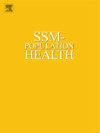Which socio-economic groups benefit most from public health expenditure in Senegal? A dynamic benefit incidence analysis
IF 3.6
2区 医学
Q1 PUBLIC, ENVIRONMENTAL & OCCUPATIONAL HEALTH
引用次数: 0
Abstract
Despite efforts to enhance public investment in Senegal’s health sector, the equitable distribution of benefits between socioeconomic groups remains largely unexplored. To address this gap, our study examines the progressive (or regressive) nature of public health expenditure. Utilizing data from the latest survey on household living conditions (2018–2019) in conjunction with administrative data on health expenditure from the same period (provided by the Ministry of Health of Senegal), we performed a benefit incidence analysis. This entailed segmenting the population by poverty quintiles and subsequently estimating how each group utilized and benefitted from public health expenditure, according to level of care and geographical location. Additionally, we performed a marginal benefit analysis to discern the impact of an increase in public health expenditure on various socioeconomic groups. Our findings unveil a pro-rich distribution of benefits at both primary healthcare and hospital levels, observable both at national and regional levels. Moreover, disparities in the distribution of resource allocation between Senegal's 14 administrative regions were observed. Ultimately, our results indicate that under prevailing conditions, increasing public health expenditure would not yield a pro-poor distribution of benefits. Therefore, our research underscores the imperative of better targeting populations for greater equity between regions and social groups.
塞内加尔哪些社会经济群体从公共卫生支出中受益最多?受益发生率动态分析
尽管塞内加尔努力加强对卫生部门的公共投资,但社会经济群体之间利益的公平分配在很大程度上仍未得到探讨。为了弥补这一差距,我们的研究考察了公共卫生支出的累进(或递减)性质。利用最新的家庭生活状况调查数据(2018-2019 年)以及同期的医疗支出行政数据(由塞内加尔卫生部提供),我们进行了福利发生率分析。这需要按照贫困五分法对人口进行细分,然后根据医疗水平和地理位置估算每个群体如何利用和受益于公共卫生支出。此外,我们还进行了边际效益分析,以了解公共卫生支出增加对不同社会经济群体的影响。我们的研究结果表明,无论是在国家层面还是在地区层面,初级医疗保健和医院层面的受益分布都很均衡。此外,我们还观察到塞内加尔 14 个行政区之间资源分配的差异。最终,我们的研究结果表明,在现有条件下,增加公共卫生支出并不能带来有利于穷人的利益分配。因此,我们的研究强调,必须更好地定位人口,以提高地区和社会群体之间的公平性。
本文章由计算机程序翻译,如有差异,请以英文原文为准。
求助全文
约1分钟内获得全文
求助全文
来源期刊

Ssm-Population Health
PUBLIC, ENVIRONMENTAL & OCCUPATIONAL HEALTH-
CiteScore
6.50
自引率
2.10%
发文量
298
审稿时长
101 days
期刊介绍:
SSM - Population Health. The new online only, open access, peer reviewed journal in all areas relating Social Science research to population health. SSM - Population Health shares the same Editors-in Chief and general approach to manuscripts as its sister journal, Social Science & Medicine. The journal takes a broad approach to the field especially welcoming interdisciplinary papers from across the Social Sciences and allied areas. SSM - Population Health offers an alternative outlet for work which might not be considered, or is classed as ''out of scope'' elsewhere, and prioritizes fast peer review and publication to the benefit of authors and readers. The journal welcomes all types of paper from traditional primary research articles, replication studies, short communications, methodological studies, instrument validation, opinion pieces, literature reviews, etc. SSM - Population Health also offers the opportunity to publish special issues or sections to reflect current interest and research in topical or developing areas. The journal fully supports authors wanting to present their research in an innovative fashion though the use of multimedia formats.
 求助内容:
求助内容: 应助结果提醒方式:
应助结果提醒方式:


